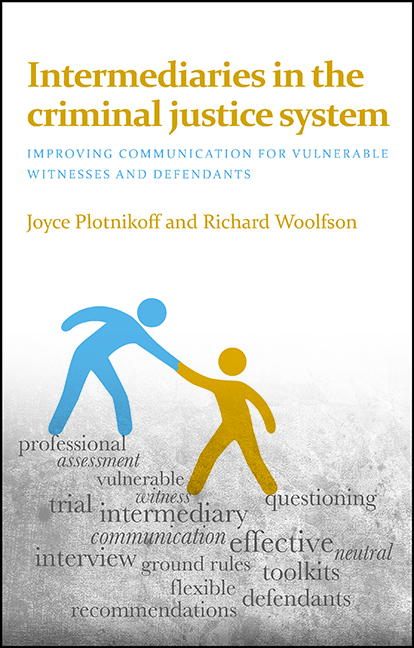 Intermediaries in the Criminal Justice System
Intermediaries in the Criminal Justice System Book contents
- Frontmatter
- Contents
- About the authors
- The Nuffield Foundation
- Acknowledgements
- Foreword
- one Introduction: a fresh pair of eyes
- two The intermediary scheme in England and Wales
- three Behind the scenes: planning to assess the witness
- four Assessment methods and involvement of the interviewer
- five Communication aids and stress reduction strategies
- six Contributing to the effectiveness of the police interview
- seven Negotiating professional space at the ground rules hearing
- eight Making the ground rules hearing effective
- nine ‘Every reasonable step’: preparation for giving evidence
- ten Cross-examination: research, case law, training and regulation
- eleven Cross-examination: intervention at trial
- twelve Cross-examination: challenges at the cutting edge
- thirteen The uneasy position of vulnerable defendants
- fourteen A new profession
- fifteen Conclusion
- References
- Index
- Table of cases
- Legislation
- Rules
- Practice directions
twelve - Cross-examination: challenges at the cutting edge
Published online by Cambridge University Press: 08 March 2022
- Frontmatter
- Contents
- About the authors
- The Nuffield Foundation
- Acknowledgements
- Foreword
- one Introduction: a fresh pair of eyes
- two The intermediary scheme in England and Wales
- three Behind the scenes: planning to assess the witness
- four Assessment methods and involvement of the interviewer
- five Communication aids and stress reduction strategies
- six Contributing to the effectiveness of the police interview
- seven Negotiating professional space at the ground rules hearing
- eight Making the ground rules hearing effective
- nine ‘Every reasonable step’: preparation for giving evidence
- ten Cross-examination: research, case law, training and regulation
- eleven Cross-examination: intervention at trial
- twelve Cross-examination: challenges at the cutting edge
- thirteen The uneasy position of vulnerable defendants
- fourteen A new profession
- fifteen Conclusion
- References
- Index
- Table of cases
- Legislation
- Rules
- Practice directions
Summary
Since special measures were introduced by the Youth Justice and Criminal Evidence Act 1999, courts have implemented a raft of changes to help vulnerable witnesses give their best evidence. The process has acquired new momentum and scope through the input of intermediaries. The most recent of the changes are also the most profound; they involve reshaping the core of conventional cross-examination.
Three of the ways cross-examination is changing are dealt with in this chapter. All have emerged or developed significantly during the period of writing this book: none has yet reached a ‘steady state’. The first involves the defence disclosing crossexamination questions to the court, and sometimes even the prosecutor (until recently, unthinkable), and subjecting them to possible revision by the judge and the intermediary (until recently, unimaginable).
The second issue relates to the development of practice, in light of Court of Appeal decisions, around restrictions on defence lawyers ‘putting their case’ to the witness. There is a sharp divide between the objective of cross-examination as defined by the justice system and that perceived by many defence practitioners. This chapter explores the resulting tension, its impact on crossexamination and some unanticipated effects on ‘best evidence’ that remain to be addressed.
The final issue concerns a pilot project to pre-record crossexamination before trial. Section 28 of the Youth Justice and Criminal Evidence Act 1999 is the last special measure of the Act to be implemented. It was first proposed by Judge Pigot over 25 years ago (Home Office, 1989). Used in combination with provisions to admit the film of the police interview as evidence-in-chief (Criminal Justice Act 1988, section 32A, as amended), this allows the whole of the witness’s evidence to be captured before the trial and played again at a retrial if that proves necessary. Implementation was delayed due to strong resistance, in part because of anticipated difficulties in expediting the prosecution’s pre-trial disclosure to the defence of material that might assist the defence case.
Western Australia introduced pre-recording of crossexamination for young witnesses in 1992 (Jackson, 2012). This is done routinely for those under 10 and is often granted for older children on prosecution applications supported by recommendations from the Child Witness Service.
- Type
- Chapter
- Information
- Intermediaries in the Criminal Justice SystemImproving Communication for Vulnerable Witnesses and Defendants, pp. 217 - 246Publisher: Bristol University PressPrint publication year: 2015


